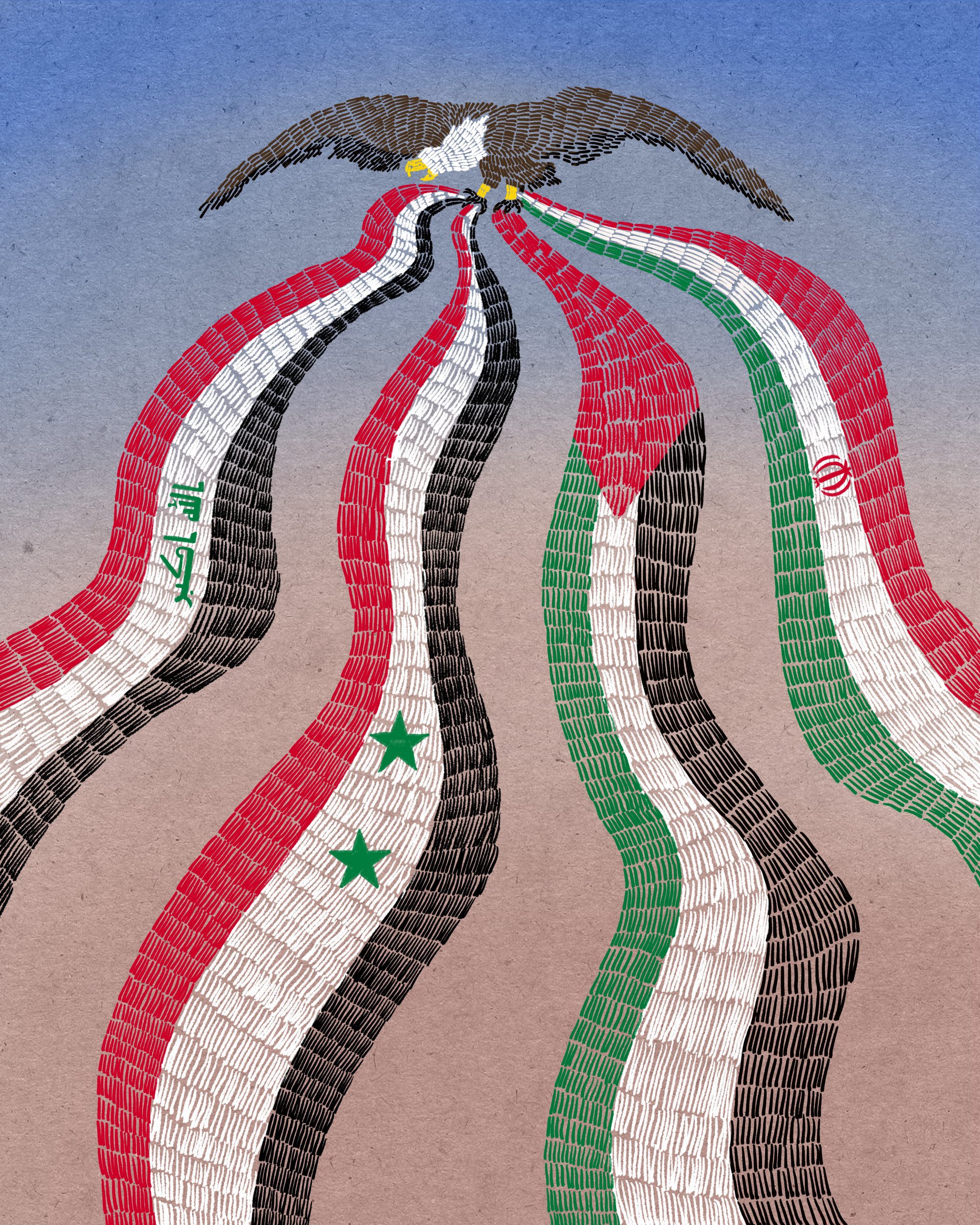The U.S. and Europe Have Desensitized the World to Violence in the Middle East

Design by Erin Choi
Image description: A bald eagle is clutching the flags of (from left to right) Iraq, Syria, Palestine, and Iran in its claws.
In 2003, United States President George Bush invaded Iraq, claiming that the nation had an arsenal filled with weapons of mass destruction, an imminent threat to the frail state of a post-9/11 United States. The Second Persian Gulf War (or Iraq War) ravaged Iraq and saw the United States unleash a series of air strikes and land invasions, torture prisoners, and capture the Iraqi capital, Baghdad. In just one of the U.S. prisons in Iraq called “Abu Ghraib,” intelligence documents indicate that American troops severely tortured, sexually assaulted, and abused captured Iraqis. Bush’s invasion, airstrikes, and sheer violence killed anywhere from 280,771 to 315,190 civilians. This figure does not consider the absolute obliteration of Iraqi infrastructure, factories, agricultural practices, cities, homes, and access to clean water. The casualties of the War on Terror have far dwarfed that of 9/11 by nearly 100 times the amount of lives.
Following an almost decade-long war, Bush later admitted that there were never weapons of mass destruction in Iraq.
The invasion was a mere scapegoat for the United States to punish something, someone, or some nation for 9/11. Iraq – a country that had no connection to 9/11 – was dealt violent consequences for an act of terror they did not commit. The U.S. invaded a nation, tortured and killed the nation’s civilians, and effectively desensitized U.S. citizens to violence in the Middle East in doing so. There is a clear lack of accountability for the lies, covering up of violence, series of sexual abuse committed, and destabilization of an entire nation and their people.
Years later, Bush publicly took a stance against Russia’s invasion of Ukraine. In a speech condemning the Russian leader, Vladimir Putin, Bush said, “The decision of one man to launch a wholly unjustified and brutal invasion of Iraq – I mean of Ukraine – heh, Iraq too. Anyway, I’m 75.” The audience roared with laughter. The United States’ leadership found a way to admit the invasion was wholly unjustified and brutal, and yet still got a charming reaction from the audience. The destruction of Iraq, the murder of its civilians, and the collapse of its state was humorous for the audience, humorous for Bush, and a key point that demonstrates just how little the lives in the Middle East matter to U.S. leadership.
I harp on this example of the Iraq War and later quotes by Bush because the desperation of the United States to place blame for the horrors of 9/11 successfully dehumanized all Middle Eastern populations for decades to follow. It unjustly grouped a population greater than the United States itself — no, really, over 100 million more Middle Easterners than U.S. citizens — as the terror in the War on Terror and as people who are repeatedly subject to retaliatory violence. Violence in and against the Middle East at the hands of Euro-America reaches much further back than 9/11 to when the Ottoman Empire was divided following the first World War. It was at this point that Europe picked apart the Ottoman Empire, dividing the territories between Britain and France. This source of division is salient; unsurprisingly, each of the nations in the Middle East became hotspots of proxy wars, power vacuums, and competition between the United States, Britain, and the Soviet Union.
Take Palestine, for example. Palestinians are consistently subject to brutality at the hands of Britain, Zionism, and U.S. military funding. When tragedy strikes Palestine, whether that be through another illegal theft of West Bank land by Israel, a violent raid by Israel, bombs dropped by Israel, a torturous imprisonment by Israel, another journalist killed by Israel, another clean water source destroyed by Israel, or another child killed by Israel, it hardly scratches the global headlines. Israel has effectively become a satellite of the U.S. to hedge against Russia (USSR at the time) and serve as a sound structure of Western influence in Asia. Violence against Palestinians at the hands of United States funding and its satellite state Israel is so constant, so persistent, that shocking reactions to Palestinian death and suffering have become far and few. Britain’s shift away from Palestine following the Second World War effectively left a power vacuum, a vacuum the U.S. would be quick to fill to hedge against the Soviets. The U.S. and Russia have collectively made the Middle East a hotspot for Cold War tensions, and their meddling has destabilized regimes and traumatized civilians.
From proxy wars between the United States and Soviet Union in Afghanistan and Syria, to Eisenhower’s covert operations that overthrew Iran’s democratic government (idiosyncratic to the Cold War era), Middle Easterners have faced the brunt of what can best be described as a pissing contest between the United States and Russia.
This insatiable reach for hegemonic power has single-handedly decimated Global South nations, cost U.S. citizens trillions in war-fuelling dollars, and repeatedly overthrown regimes in the Middle East. Nearly 60 years after the 1953 coup in Iran which overthrew the democratically elected Iranian Prime Minister Mohammad Mossadegh, the CIA admitted to the central role the U.S. played in the operation. This in turn begs the question, why would the U.S. – an unabashed “model” of freedom and democracy – intentionally overthrow a freely and fairly elected government? A key part of the answer: to preserve and protect British interests in Iranian oil. When the English discovered Mossadegh’s plans to nationalize Iran’s oil industries and effectively curb Britain’s imperialistic control of Iranian oil reserves, they reached out to their closest ally, the U.S., for help. Together, the U.S. and Britain overthrew Mossadegh, solidifying their continued role as unapologetic destabilizing neo-imperialists.
Decades after Eisenhower-era Cold War tactics, the unscrupulous manipulation and destruction of the Middle East has only explored new technological bounds. Consider the 2000s era Obama Administration, for example. Under Obama, the U.S. conducted thousands of drone strikes across Yemen, Somalia, and Afghanistan — even greater than the administration of his predecessor Bush — that took innocent lives, decimated lands, and traumatized generations of people. An article titled “If Obama Apologized For 1 Civilian Drone Victim Every Day, It Would Take Him 3 Years,” outlines the repeated failures of these drone strikes, and evidence demonstrates that the administration severely underreported the numbers of civilian casualties. Interestingly, it was a whistleblower who leaked documents that indicated not only the brutality of these strikes, but also the very fact that the administration continued to kill a much greater number of individuals than contrived.
Collecting all of the information discussed so far into a highly generalized timeline, we can see the following events: Europe chops up the Ottoman Empire and effectively colonizes as they see fit, the United States and Britain collectively destroy Palestinian sovereignty to make way for the settler colonial state of Israel, the U.S. overthrows the Iranian government, Russia and the U.S. engage in proxy wars over several countries, and Bush and Obama bomb, invade, and murder the Middle Eastern peoples. This may as well be a drop in the bucket of the true turmoil Europe and the U.S. have caused in a land that does not belong to them. Constant violence, disregard for civilian life, and destruction of lands mean absolutely nothing to the apathetic U.S. or Europe but everything to the Middle Easterners whose suffering is dismissed, glossed over, yesterday’s news.
It is why the death of Palestinians does not spark a shock in the headlines, and why the destruction of Notre Dame raised over a billion dollars in recovery funds and evoked greater global sympathy than the nearly 50,000 dead in the 2023 Turkish and Syrian earthquakes.
The reality is, the nearly-global desensitization to violence in the Middle East is a calculated effect of the larger neo-imperialist projects of the U.S. and Europe. It is much easier to manipulate the borders of a region, implant satellite states, and repeatedly bomb Middle East nations when the world has become not only accustomed to the violence, but almost conditioned to expect it. The desensitization of Middle Eastern lives has worked and continues to work to the benefit of European and U.S. ambitions of hegemonic power.



